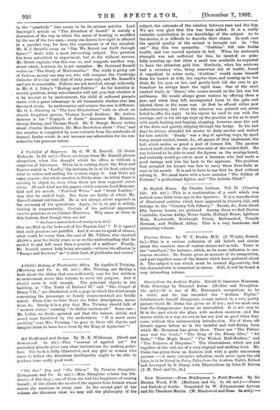SOME BOOKS OF TILE WEEK.
[Under this heading we notice such Books of the week as have not been reserved for review in other forms.1 is the "quarterly" line seems to be its science articles. Lord Rayleigh's article on "The Direction of Sound" is mainly a discussion of the way in which the sense of hearing is modified by the use of the two ears,—every one knows bow sight is affected in a parallel way, for hero the experiment is of the simplest. Mr. R. J. Strutt's essay on "Can We Detect our Drift through Space ? " deals with a most interesting subject. The question Gas been submitted to experiment, but so far without success. Mr. Strutt explains why this was so, and suggests another way, about which, however, he is not sanguine. Mr. Bertrand Russell writes on "The Study of Mathematics." The study is going out of fashion, as any one may sea who will compare the Cambridge Calendar of to-clay with that of sixty years ago, and Mr. Russell's apologia is seasonable. Politics are not touched, except indirectly in Mr. G. A. Paley's "Biology and Politics." As for heredity in mental qualities, every schoolmaster will tell you that whether it is by descent or by environment, the child of cultured parents starts with a great advantage in all humanistic studies over less favoured rivals. In mathematics and science the case is different. Mr. G. L. Strachey in "The Last Elizabethan" tells us about an almost forgotten genius, Thomas Lovell Beddoes. Mr. Arthur Symons in his " Triptych of Poets " discusses Mrs. Hemans, George Darley, and Thomas Hood. Mr. T. Sturge Moore writes about Charles Baudelaire, Mr. Max Beerbohm about " Fire," and the number is completed by some extracts from the notebooks of Samuel Butler which do not increase our admiration for his con- siderable but perverse talent.











































































 Previous page
Previous page